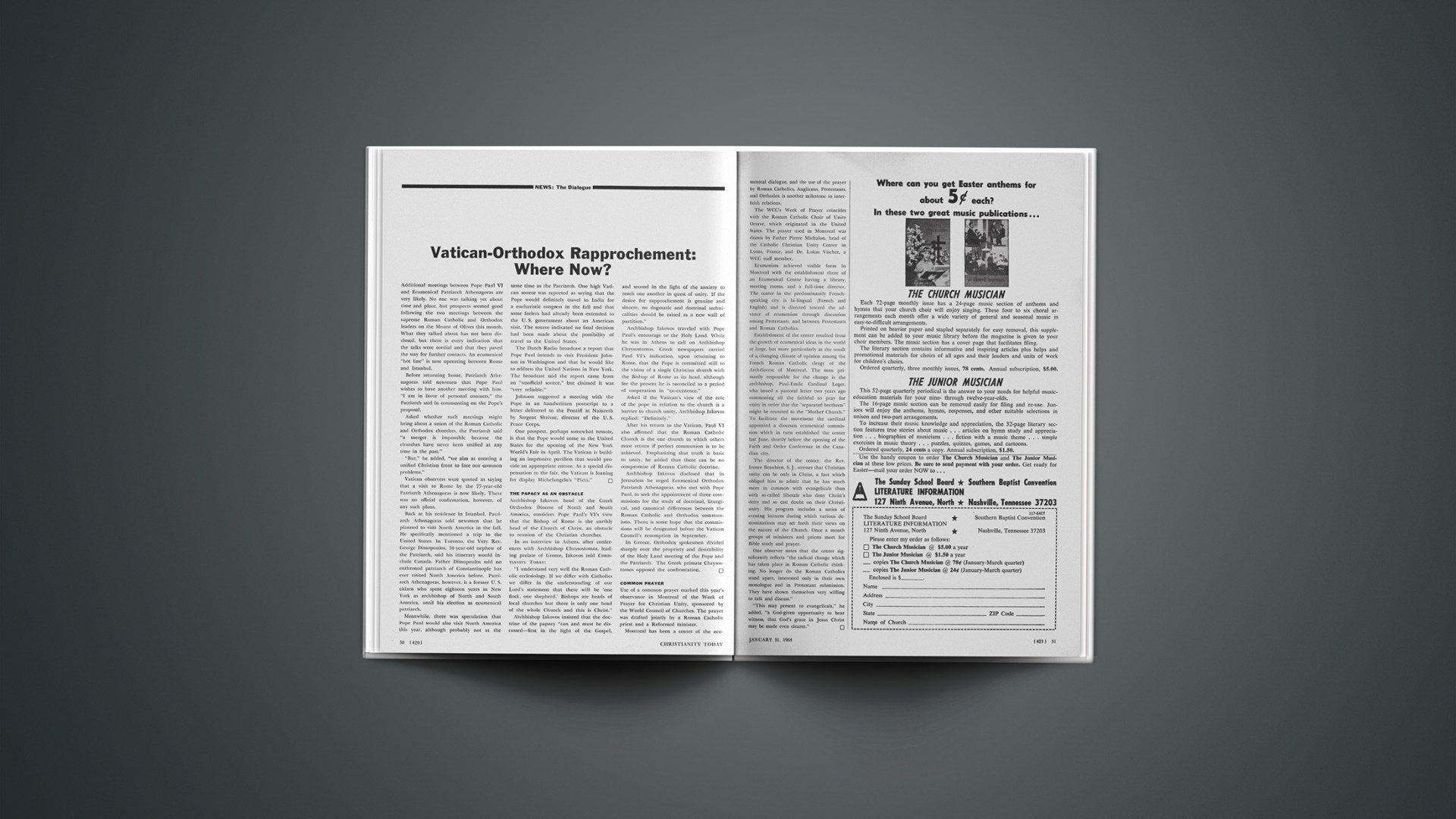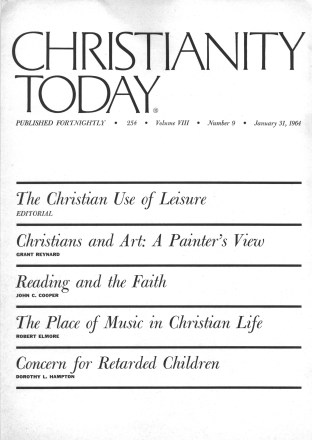Additional meetings between Pope Paul VI and Ecumenical Patriarch Athenagoras are very likely. No one was talking yet about time and place, but prospects seemed good following the two meetings between the supreme Roman Catholic and Orthodox leaders on the Mount of Olives this month. What they talked about has not been disclosed, but there is every indication that the talks were cordial and that they paved the way for further contacts. An ecumenical “hot line” is now operating between Rome and Istanbul.
Before returning home, Patriarch Athenagoras told newsmen that Pope Paul wishes to have another meeting with him. “I am in favor of personal contacts,” the Patriarch said in commenting on the Pope’s proposal.
Asked whether such meetings might bring about a union of the Roman Catholic and Orthodox churches, the Patriarch said “a merger is impossible because the churches have never been unified at any time in the past.”
“But,” he added, “we aim at creating a unified Christian front to face our common problems.”
Vatican observers were quoted as saying that a visit to Rome by the 77-year-old Patriarch Athenagoras is now likely. There was no official confirmation, however, of any such plans.
Back at his residence in Istanbul, Patriarch Athenagoras told newsmen that he planned to visit North America in the fall. He specifically mentioned a trip to the United States. In Toronto, the Very Rev. George Dimopoulos, 34-year-old nephew of the Patriarch, said his itinerary would include Canada. Father Dimopoulos said no enthroned patriarch of Constantinople has ever visited North America before. Patriarch Athenagoras, however, is a former U. S. citizen who spent eighteen years in New York as archbishop of North and South America, until his election as ecumenical patriarch.
Meanwhile, there was speculation that Pope Paul would also visit North America this year, although probably not at the same time as the Patriarch. One high Vatican source was reported as saying that the Pope would definitely travel to India for a eucharistic congress in the fall and that some feelers had already been extended to the U. S. government about an American visit. The source indicated no final decision had been made about the possibility of travel to the United States.
The Dutch Radio broadcast a report that Pope Paul intends to visit President Johnson in Washington and that he would like to address the United Nations in New York. The broadcast said the report came from an “unofficial source,” but claimed it was “very reliable.”
Johnson suggested a meeting with the Pope in an handwritten postscript to a letter delivered to the Pontiff at Nazareth by Sargent Shriver, director of the U. S. Peace Corps.
One prospect, perhaps somewhat remote, is that the Pope would come to the United States for the opening of the New York World’s Fair in April. The Vatican is building an impressive pavilion that would provide an appropriate entree. As a special dispensation to the fair, the Vatican is loaning for display Michelangelo’s “Pietà.”
The Papacy As An Obstacle
Archbishop Iakovos, head of the Greek Orthodox Diocese of North and South America, considers Pope Paul’s VI’s view that the Bishop of Rome is the earthly head of the Church of Christ, an obstacle to reunion of the Christian churches.
In an interview in Athens, after conferences with Archbishop Chrysostomos, leading prelate of Greece, Iakovos told CHRISTIANITY TODAY:
“I understand very well the Roman Catholic ecclesiology. If we differ with Catholics we differ in the understanding of our Lord’s statement that there will be ‘one flock, one shepherd.’ Bishops are heads of local churches but there is only one head of the whole Church and this is Christ.”
Archbishop Iakovos insisted that the doctrine of the papacy “can and must be discussed—first in the light of the Gospel, and second in the light of the anxiety to reach one another in quest of unity. If the desire for rapprochement is genuine and sincere, no dogmatic and doctrinal technicalities should be raised as a new wall of partition.”
Archbishop Iakovos traveled with Pope Paul’s entourage to the Holy Land. While he was in Athens to call on Archbishop Chrysostomos, Greek newspapers carried Paul VI’s indication, upon returning to Rome, that the Pope is committed still to the vision of a single Christian church with the Bishop of Rome as its head, although for the present he is reconciled to a period of cooperation in “co-existence.”
Asked if the Vatican’s view of the role of the pope in relation to the church is a barrier to church unity, Archbishop Iakovos replied: “Definitely.”
After his return to the Vatican, Paul VI also affirmed that the Roman Catholic Church is the one church to which others must return if perfect communion is to be achieved. Emphasizing that truth is basic to unity, he added that there can be no compromise of Roman Catholic doctrine.
Archbishop Iakovos disclosed that in Jerusalem he urged Ecumenical Orthodox Patriarch Athenagoras, who met with Pope Paul, to seek the appointment of three commissions for the study of doctrinal, liturgical, and canonical differences between the Roman Catholic and Orthodox communions. There is some hope that the commissions will be designated before the Vatican Council’s resumption in September.
In Greece, Orthodox spokesmen divided sharply over the propriety and desirability of the Holy Land meeting of the Pope and the Patriarch. The Greek primate Chrysostomos opposed the confrontation.
Common Prayer
Use of a common prayer marked this year’s observance in Montreal of the Week of Prayer for Christian Unity, sponsored by the World Council of Churches. The prayer was drafted jointly by a Roman Catholic priest and a Reformed minister.
Montreal has been a center of the ecumenical dialogue, and the use of the prayer by Roman Catholics, Anglicans, Protestants, and Orthodox is another milestone in interfaith relations.
The WCC’s Week of Prayer coincides with the Roman Catholic Chair of Unity Octave, which originated in the United States. The prayer used in Montreal was drawn by Father Pierre Michalon, head of the Catholic Christian Unity Center in Lyons, France, and Dr. Lukas Vischer, a WCC staff member.
Ecumenism achieved visible form in Montreal with the establishment there of an Ecumenical Centre having a library, meeting rooms, and a full-time director. The center in the predominantly French-speaking city is bi-lingual (French and English) and is directed toward the advance of ecumenism through discussion among Protestants, and between Protestants and Roman Catholics.
Establishment of the center resulted from the growth of ecumenical ideas in the world at large, but more particularly as the result of a changing climate of opinion among the French Roman Catholic clergy of the Archdiocese of Montreal. The man primarily responsible for the change is the archbishop, Paul-Emile Cardinal Leger, who issued a pastoral letter two years ago summoning all the faithful to pray for unity in order that the “separated brethren” might be reunited to the “Mother Church.” To facilitate the movement the cardinal appointed a diocesan ecumenical commission which in turn established the center last June, shortly before the opening of the Faith and Order Conference in the Canadian city.
The director of the center, the Rev. Irenee Beaubien, S. J., stresses that Christian unity can be only in Christ, a fact which obliged him to admit that he has much more in common with evangelicals than with so-called liberals who deny Christ’s deity and so cast doubt on their Christianity. His program includes a series of evening lectures during which various denominations may set forth their views on the nature of the Church. Once a month groups of ministers and priests meet for Bible study and prayer.
One observer notes that the center significantly reflects “the radical change which has taken place in Roman Catholic thinking. No longer do the Roman Catholics stand apart, interested only in their own monologue and in Protestant submission. They have shown themselves very willing to talk and discuss.”
“This may present to evangelicals,” he added, “a God-given opportunity to bear witness, that God’s grace in Jesus Christ may be made even clearer.”










